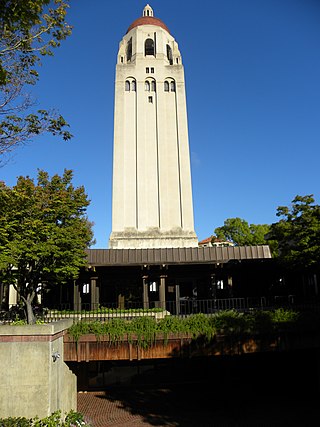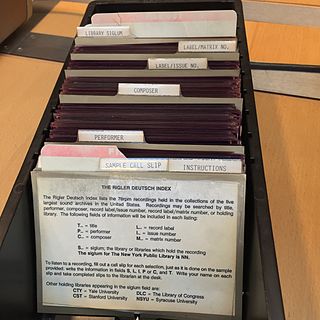Related Research Articles

Inter-library loan is a service that enables patrons of one library to borrow materials that are held by another library.
MARC is a standard set of digital formats for the machine-readable description of items catalogued by libraries, such as books, DVDs, and digital resources. Computerized library catalogs and library management software need to structure their catalog records as per an industry-wide standard, which is MARC, so that bibliographic information can be shared freely between computers. The structure of bibliographic records almost universally follows the MARC standard. Other standards work in conjunction with MARC, for example, Anglo-American Cataloguing Rules (AACR)/Resource Description and Access (RDA) provide guidelines on formulating bibliographic data into the MARC record structure, while the International Standard Bibliographic Description (ISBD) provides guidelines for displaying MARC records in a standard, human-readable form.

OCLC, Inc., doing business as OCLC, is an American nonprofit cooperative organization "that provides shared technology services, original research, and community programs for its membership and the library community at large". It was founded in 1967 as the Ohio College Library Center, then became the Online Computer Library Center as it expanded. In 2017, the name was formally changed to OCLC, Inc. OCLC and thousands of its member libraries cooperatively produce and maintain WorldCat, the largest online public access catalog in the world. OCLC is funded mainly by the fees that libraries pay for the many different services it offers. OCLC also maintains the Dewey Decimal Classification system.

WorldCat is a union catalog that itemizes the collections of tens of thousands of institutions, in many countries, that are current or past members of the OCLC global cooperative. It is operated by OCLC, Inc. Many of the OCLC member libraries collectively maintain WorldCat's database, the world's largest bibliographic database. The database includes other information sources in addition to member library collections. OCLC makes WorldCat itself available free to libraries, but the catalog is the foundation for other subscription OCLC services. WorldCat is used by librarians for cataloging and research and by the general public.
RedLightGreen was a database of bibliographic descriptions on the Web created by Research Libraries Group (RLG). It used a set of four million records extracted from OCLC's WorldCat database, and was designed to help novice users make selections from the vast bibliographic resources they would encounter in such a large set. RedLightGreen also allowed users to create citations for works found.
Encoded Archival Description (EAD) is a standard for encoding descriptive information regarding archival records.
Eureka was the user interface for general users of the Research Library Information Network (RLIN), a bibliographic resource containing records from libraries that were members of Research Libraries Group (RLG). Eureka had the capacity to search among approximately 45 million different titles. Most of the catalog was from major research libraries and museums in the United States. Despite the OPAC formulation, Eureka technically was not a public access search engine. It was generally accessible only from networks connected to research institutions, such as universities.
ArchiveGrid is a collection of over five million archival material descriptions, including MARC records from WorldCat and finding aids harvested from the web. It contains archival collections held by thousands of libraries, museums, historical societies, and archives. Contribution to the system is available to any institution. Most of the contributions are from United States based institutions, but many other countries are represented, including Canada, Australia, and the United Kingdom. ArchiveGrid is associated with OCLC Research and helps to advance their goals of making archival collections and materials easier to find. ArchiveGrid is described as "the ultimate destination for searching through family histories, political papers, and historical records held in archives around the world."
The International Coalition of Library Consortia (ICOLC) is an informal, self-organized group of library consortia from around the world; it exists for the strategic and practical discussions of issues of common interest among its consortia members. The ICOLC first met informally as the Consortium of Consortia (COC) in 1997. Over time, its name was adjusted to reflect its increasingly global character.
The Center for Research Libraries is a consortium of North American universities, colleges, and independent research libraries, based on a buy-in concept for membership of the consortia. The consortium acquires and preserves traditional and digital resources for research and teaching and makes them available to member institutions through interlibrary loan and electronic delivery. It also gathers and analyzes data pertaining to the preservation of physical and digital resources, and fosters the sharing of expertise, in order to assist member libraries in maintaining their collections.
Keio Media Centers is the English name used by Keio University in Japan to describe its library system.

James G. Neal is an American librarian, library administrator, and a prominent figure in American and international library associations. In 2022, President Joe Biden appointed him to the National Museum and Library Services Board which advises the agency on general policies with respect to the duties, powers, and authority of the Institute of Museum and Library Services relating to museum, library, and information services, as well as the annual selection of the National Medal for Museum and Library Service.

The International Internet Preservation Consortium is an international organization of libraries and other organizations established to coordinate efforts to preserve internet content for the future. It was founded in July 2003 by 12 participating institutions, and had grown to 35 members by January 2010. As of January 2022, there are 52 members.
NUCMC is the abbreviation for the National Union Catalog of Manuscript Collections. It is a national-level program based at the Library of Congress that seeks to promote free access to the documentary heritage of the United States. It does this by providing cataloging for archives and historical societies around the country that do not have access to national online databases. The program started in 1959 and published bound volumes of cataloging records from 1962 to 1993. One famed editor was Arline Custer, Head of the Manuscript Section, Descriptive Cataloging Division of the Library of Congress. As of 1986, the cataloging records were input into RLIN, the Research Libraries Information Network, an international online database. As of September 2007, all cataloging records in RLIN have been migrated into the OCLC database (WorldCat), since RLIN was merged into OCLC. All cataloging since that time has been input into OCLC. It is not related to the NUC Pre-1956 volumes.
A library consortium is any cooperative association of libraries that coordinates resources and/or activities on behalf of its members, whether they are academic, public, school or special libraries, and/or information centers. Library consortia have been created to service specific regions or geographic areas, e.g., local, state, regional, national or international. Many libraries commonly belong to multiple consortia. The goal of a library consortium is to amplify the capabilities and effectiveness of its member libraries through collective action, including, but not limited to, print or electronic resource sharing, reducing costs through group purchases of resources, and hosting professional development opportunities. The “bedrock principle upon which consortia operate is that libraries can accomplish more together than alone.”

The Hoover Institution Library and Archives is a research center and archival repository located at Stanford University, near Palo Alto, California in the United States. Built around a collection amassed by Stanford graduate Herbert Hoover prior to his becoming President of the United States, the Hoover Library and Archives is largely dedicated to the world history of the 20th and 21st centuries. It includes one of the largest collections of political posters in the world.
BIBFRAME is a data model for bibliographic description. BIBFRAME was designed to replace the MARC standards, and to use linked data principles to make bibliographic data more useful both within and outside the library community.

The Rigler and Deutsch Index of Recorded Sound, also known as the Rigler Deutsch Index, is a union catalog collocation of the U.S. holdings of 78 rpm records in the collections of the Library of Congress Motion Picture, Broadcasting, and Recorded Sound Division; the Rodgers and Hammerstein Archives of Recorded Sound at the New York Public Library; Belfer Audio Laboratory and Archive at Syracuse University; the Yale Collection of Historical Sound Recordings at Yale University; and the Stanford Archive of Recorded Sound at Stanford University.
The Consortium of European Research Libraries (CERL) is a consortium of research libraries, primarily in Europe, that facilitates access to historians with an interest in the history of the book by providing online resources. The organisation also makes grants to librarians, holds seminars and workshops, and since 1998 has published a periodical called CERL Papers. It was founded in 1992 and since 2021 has been registered in the Republic of Ireland as a company limited by guarantee, based in Dublin.

Sarah M. Pritchard is an American academic librarian known for her contributions to research library governance, women's studies and the future of digital libraries.
References
- 1 2 "Collecting Levels". Library of Congress. loc.gov. Retrieved 2017-06-19.
- 1 2 3 4 5 6 7 8 "History of the OCLC Research Library Partnership". OCLC Research. oclc.org/research. Retrieved 2017-06-21.
- ↑ Edwards, Glynn (June 17, 2014). "Research Libraries Group (RLG) records now available". Stanford Libraries. library.stanford.edu. Retrieved 2017-06-21.
- ↑ van Camp, Anne (2003). "RLG, Where Museums, Libraries, and Archives Intersect". LIBER Quarterly. Vol. 13, no. 3/4. doi : 10.18352/lq.7744 Retrieved 2017-06-21.
- 1 2 Wilson, Lizabeth; Neal, James; Jordan, Jay (October 2006). "RLG and OCLC: Combining for the Future" (guest editorial). Library and Information Science. Vol. 6, no. 4. Retrieved via Project Muse database, 2017-06-21.
- ↑ "RLG to Combine with OCLC" (press release). OCLC Worldwide. May 3, 2006. worldcat.org. Retrieved 2017-06-22.
- ↑ "Guide to the Research Libraries Group, Inc. (RLG) records". Stanford University Libraries, Manuscripts Division. Retrieved 2017-06-22.